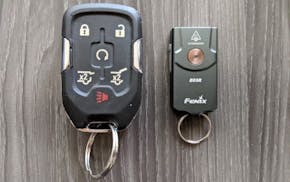Q: In one of your recent columns, someone wrote regarding a runaway Grand Marquis. Shifting into neutral works well, but I wonder if turning off the key would lock the steering wheel. It does this when I shut off my car in the driveway.
A: Absolutely not. The ignition key can be turned to the "off" position but not to the "lock" position, which would lock the steering column, unless the shift lever is in "park." Thus, the best ways to deal with some type of stuck throttle/unintended acceleration are to shift into neutral to disengage the drivetrain completely and/or turn the key to "off" to shut off the engine. Even with the engine not running, the brake vacuum reservoir or hydraulic accumulator will supply several applications of power brake assist to help you stop the vehicle.
One more very important point: Motor vehicles have five "engines." The engine under the hood converts the energy in fuel into heat through combustion, and combustion into power driving the wheels. The other four "engines" are located at each wheel and are called brakes. Each brake converts the energy of motion into heat through friction and dissipates that heat into the atmosphere.
The four brake "engines" are cumulatively more powerful than the underhood engine. This means that even with the throttle open, the brakes still have the potential to slow the vehicle.
Q: Help! What's this high-pitched hum that happens to my '05 Ford Escape when it gets cooler? Didn't hear it all summer but now IT'S BACK! The only time it stops is when I step on the brakes. My mechanic brother says he's never heard of that. What should I check to stop the squealing? Can I drive with one foot on the brakes and the other on the gas? P.S., my brother's advice is to turn up the radio.
A: Stop the squealing? Let go of your brother's neck! Here are several possible sources for the noise: brake pads, wheel bearing/hub, serpentine belt and brake vacuum reservoir/check valve.
Brake pad wear tabs will begin to squeal lightly when the pads are worn to the point of needing replacement. This vibration is dampened when the brakes are applied and the squeal stops. This is not typically a seasonal issue.
A worn wheel bearing or hub assembly will tend to "hum" under certain conditions like turning and can be dampened by braking. Again, this issue is not typically sensitive to ambient temperature.
In cooler conditions the alternator might need to work harder to provide current for the heater fan, defroster, headlights, etc. The additional load on the serpentine belt might be causing slippage and squealing while under power.
Worn, stiff or cracked hoses or fittings in the power brake vacuum system, including the vacuum reservoir and check valve, might be "whistling" until you apply the brakes. The rubber hoses and diaphragm in the reservoir might be sensitive to cooler temperatures.
While I'm a fan of left-foot braking, I don't think it's a good idea in this case since you'd have to keep a bit of brake pressure on the pedal to stop the noise, which could lead to brake drag, excess heat and even higher volume on the radio necessary to cover your screams as the brakes fade!
Q: I have a 1997 Mazda B4000 with a 4.0-liter V6 engine and auto transmission. I have a "check engine" light with code 1443 coming up. I have replaced the vapor canister, purge valve solenoid, sensor and all the hoses. The truck's performance is unaffected but the light still comes back on after reset. Any idea about what is causing this?
A: Check for low engine vacuum or some type of vacuum leak between the intake manifold and the purge flow sensor. With the engine idling, pull off the hose at the sensor and plug it with your thumb. Is there strong, constant vacuum? If not, this could cause this issue.

Motormouth: Oil type not an issue


